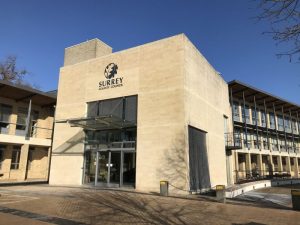Children have been told they can walk 4.9km through fields and over an unguarded railway line by Surrey County Council bureaucrats who cancelled their free bus passes.
The decision has left their family feeling “let down” and “frustrated” after the vital service relied upon for years was cut because a 10 kilometre hike was found by county hall officials.
Joe Massey was sent the letter informing him of the council’s decision after a “review” found the route was considered a safe walking route for children travelling from South Nutfield to Carrington School in Redhill.
The free bus service historically served the area but the so-called discovery of the new route means notice has been served on those who depended on the county council’s travel assistance.
Normally, free bus access is only provided to those who live more than three miles from their chosen school.
South Nutfield is within that distance but the narrow lanes linking the village to the school are unsafe for young people to walk along.
Now the council has written to parents telling them that a new 4.95 kilometre route – across muddy fields and unprotected railway lines is a suitable alternative – but as a precaution children should wear suitable footwear as the farmer’s field is prone to flooding.
The instructions, seen by the LDRS, on how the children should get to school read: “Follow the public right of way until you reach Mid Street.
“In places it is narrow, and it can be muddy with surface water, occasionally liable to flooding so appropriate footwear would be advisable after inclement weather.
“There are two stiles to climb over; these are easily scaled.
“The train track is an open crossing with no gates, barriers, attendant or traffic lights. The sightlines in both directions are long, straight and clear. It is a rural line, Redhill to Tonbridge, on average there are two trains per hour and occasionally a freight train making it safe to cross.”
Adding: “The public right of way continues across a farmer’s field which it can be muddy with surface water, occasionally liable to flooding.”
The decision was taken by the Surrey Travel & Assessment team alongside the Safer Travel team who had reviewed a number of routes across the county previously been deemed unsafe.
They team wrote: “We understand that this may be disappointing news, however we have undertaken a thorough investigation into your child’s current eligibility, applying the travel assistance policy robustly, and this is the resulting outcome. “
Joe Massey, said they have two boys who will be impacted, one in year 10 the other in year 7.
He said: “We qualify for the council’s assisted travel scheme because the nearest school to us is over three miles away but we’ve received a letter f saying that as of September next year they’re going to be cancelling both passes – because they’ve found an alternative route that’s less than three miles.
“A big chunk of it is cross country through cow fields and rail roads with no bridge. It’s just open tracks.
“It’s a public right of way. We did the walk, there’s a cow field, you’re wading through mud.
“The council says it’s fine because its only 2.96 miles but the app says 3.06.”
“Some of the roads are really uncomfortable to walk along and to expect anyone to do it, especially in winter, is just unsuitable.
“And the fields are not lit at all; it’s just plain dangerous.”
Mr Massey said: “I’m extremely frustrated by the situation. Obviously the money is a big thing but it’s the principle.
“It took us an hour to do it, there’s no way in hell you’d send your child on that route.
“To then expect your child to walk for an hour ,they’re going to be exhausted.
“My wellies were caked in mud – they said in the letter to wear suitable footwear.
“It’s traumatic enough at secondary school but to have to carry muddy wellies around all day….
“We just feel let down and the option they’ve given us is just unbelievable.
“If any normal human being would have looked at that route, I can’t believe they would have sent the letter.”
Clare Curran, SCC cabinet member for children, families and lifelong learning said: “This route has been established between South Nutfield and Carrington School following individual Safe Walking Route assessments that were carried out by the council.
“Safety of route assessments are carried out in line with Road Safety GB Guidelines. It is important to note that this is an assessment of the road safety of a walked route by an accompanied child – national guidance advises that the child should be “accompanied as necessary”. It is the expectation that the child, and the accompanying adult, will wear appropriate clothing and footwear for the conditions underfoot.
“The current travel assistance provided by the council is an annual bus pass on a public bus service. This costs the Council £881 per year for each pupil. In line with statutory guidance, these pupils are no longer eligible to receive a free bus pass through the council. Amidst a set of challenging financial circumstances, the council is not in the position to continue to pay for transport for families where they are no longer eligible for assistance, due to a safe route being established.
“The council is not prescribing that children should walk to school via the safe route that has been established; the option is still available to use the bus service. Families will be able to purchase a bus pass directly from the operator to continue to use the bus. Families can appeal against the decision to withdraw travel assistance via the stage one safety of route appeal form, and a link to this was included in the initial correspondence with the family.”
Image Joe Massey – on the new school walk











